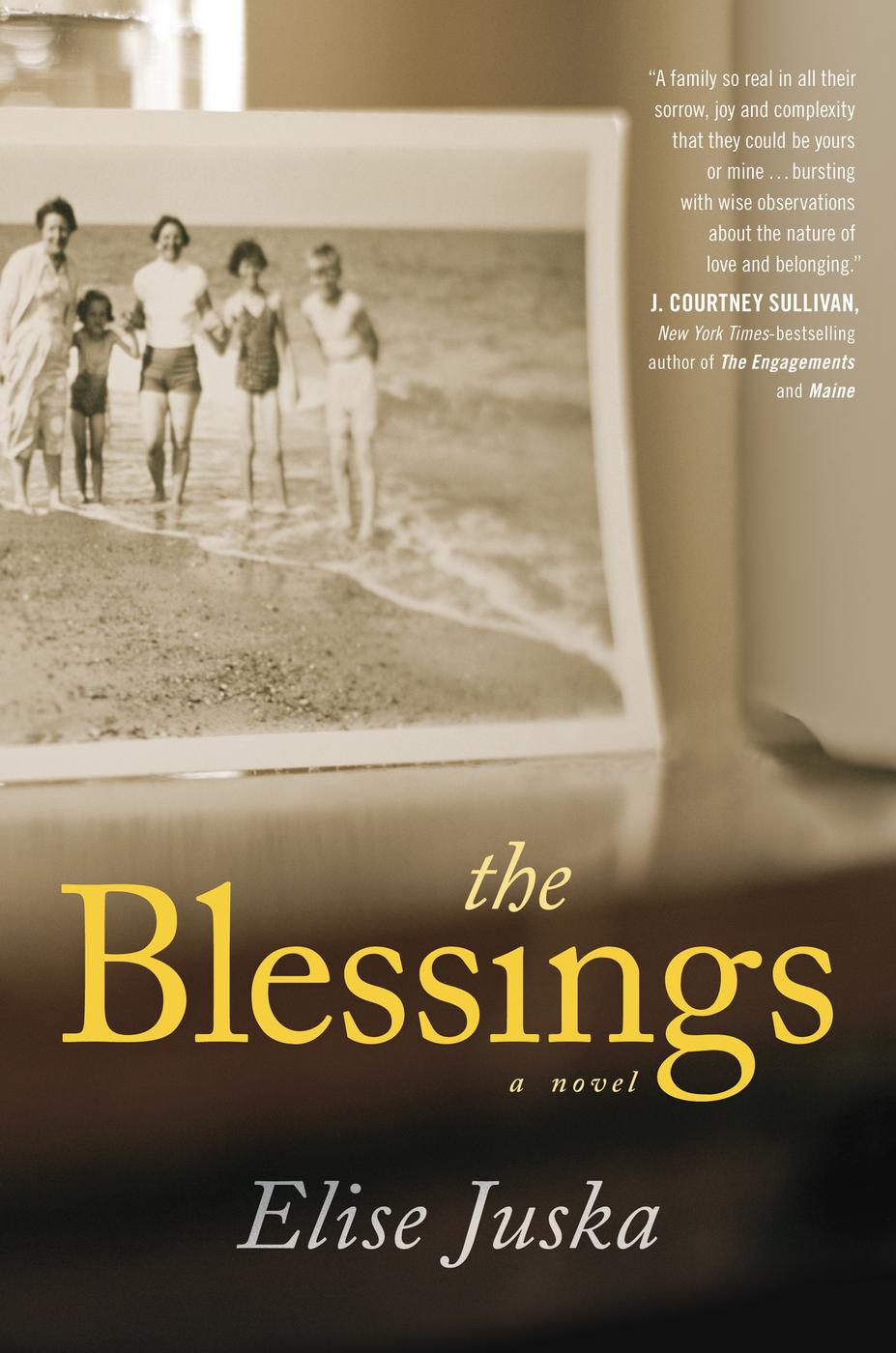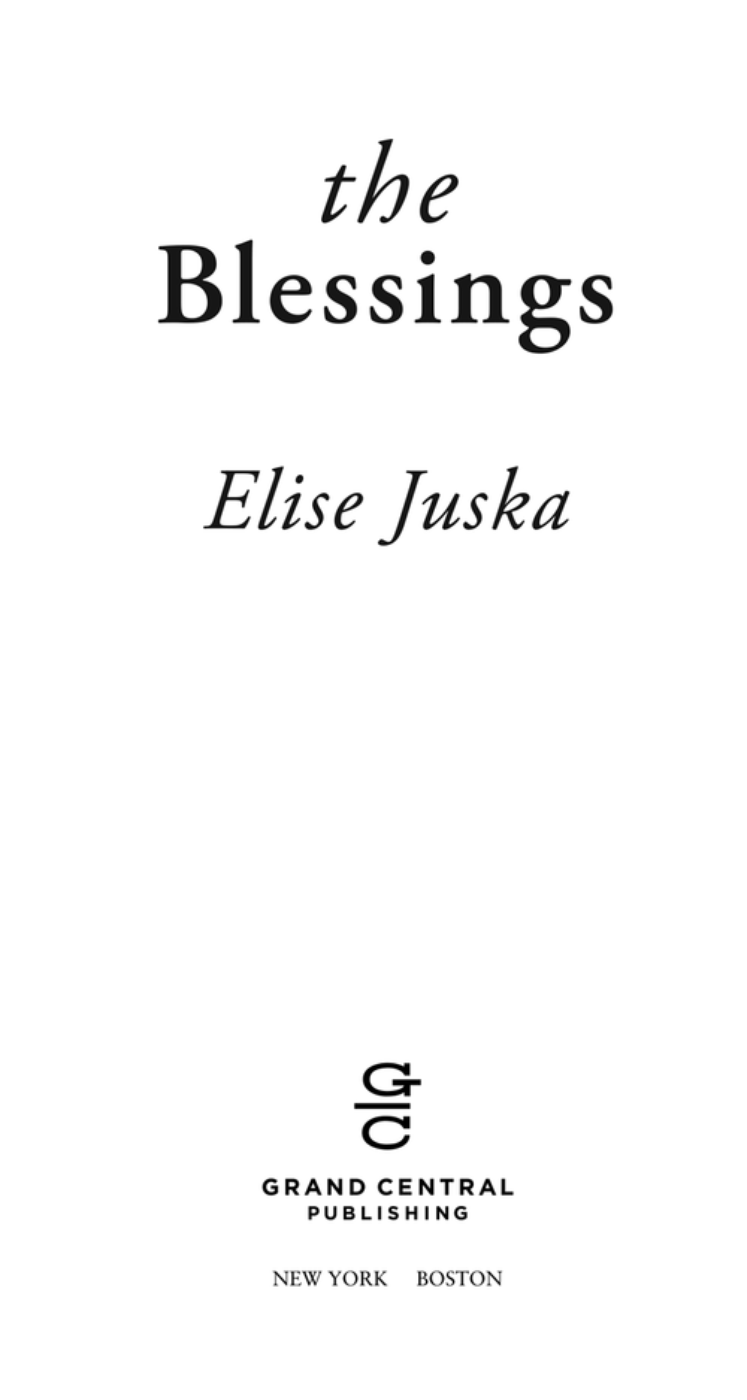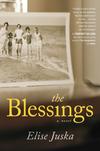The Blessings
Authors: Elise Juska



In accordance with the U.S. Copyright Act of 1976, the scanning, uploading, and electronic sharing of any part of this book without the permission of the publisher constitute unlawful piracy and theft of the author's intellectual property. If you would like to use material from the book (other than for review purposes), prior written permission must be obtained by contacting the publisher at [email protected]. Thank you for your support of the author's rights.
For Catherine Pierce
I
t didn't take long for Abby to discover at college that most people did not have families like hers. Her roommates, Nicole and Mara, were amazed and amused by the letters cramming Abby's mailbox in the student unionânotes from her aunts and twenty-dollar bills from her uncles, newspaper articles about the Phillies and the Eagles, her little sister's drawings of stick figures and housesâPhilly row houses, tall and wobbly, crowned
COME HOME SOON!
âwhich Abby taped on the wall above her bed until it looked like one of her aunts' refrigerator doors. Her roommates laughedâ
I didn't get this much mail at summer camp
. Abby had never gone to summer camp; she had never gone anywhere without her family, the entire clan, aunts and uncles and cousins renting houses within the same two blocks at the Jersey shore. They were a perennial mob at band concerts and Little League games, a discreet crowd of cameras in the living room before school dances. (“Are you serious?” Mara had paused here, a spoonful of cereal halfway to her mouth. “Were you
dying
?”) None of this had struck Abby as remarkable before. But since going to college, she has begun to perceive her own uniqueness, to recognize her family as something apart from other families, with its own rhythm and code.
Epiphany
âit was a term she'd learned in her James Joyce seminar: the sudden realization of a larger truth.
On Sunday nights, Abby sank into the sound of her parents' voices, pressing the phone to her ear. It was 1992 and the hall phones were too publicâthe one time she'd talked to her mother there, voice trembling, she'd drawn sympathetic looks from the girls walking by holding flip-flops and plastic shower caddiesâso she started going to the phone booth in the student union and sitting on the floor. Listening to her parents' measured voices, their talk of ordinary thingsâher new cousin Max's baptism, the eighteen points her cousin Joey scored in the basketball game against St. Cecilia'sâshe was overcome with a longing so great that it doubled her over, eyes full, knees drawn to her chin. The ruff from her new parka caught in her mouth. It was so cold in New Englandâwhy had she decided to go to college in New England? Something about the brochureâthe picture of the quad in the snow, and the beginnings of a faint tug that would intensify as she got older, the sense that she belonged somewhere else.
But at eighteen, in the phone booth, Abby was so homesick that her stomach hurt. She reminded herself over and over that she would be home soon for Christmas break. For Thanksgiving, she'd accepted an invitation to Mara's house in Boston. Flights to Philadelphia were too expensive; it was a ten-hour drive, and she didn't have a ride. Her parents had wanted her to take a bus and trainâher dad had even offered to drive up and get herâbut Mara's was so much closer, and Abby was kind of pleased to have been invited. But as soon as Abby sat down to Thanksgiving dinner, she longed to be home. She missed her family, their unfancy stuffing and canned cranberry, the beat of calm silence when Pop said grace, the warm bluster of food passed around the long, crowded table, a plywood extender jammed in the middle so that one end nosed halfway across the kitchen floor. Dinner at Mara's was depressingly small (six people, including Abby) and formal. It had actually never occurred to Abby that other people's Thanksgivings might be like this. When she called home that night (collect, as her mother had instructed), every one of her aunts and uncles and cousins took a turn on the phoneâbaby Max held next to the receiver, crying, even her cousins Stephen and Joey mumbling, “Happy Thanksgiving”âand Abby chewed mercilessly on the inside of her cheek so she didn't cry herself.
For Christmas, Abby had found a girl on the ride board, a junior with a red Jeep who lived in Harrisburg and blared
The Joshua Tree
on an endless loop. She dropped Abby at a rest stop on the Pennsylvania Turnpike, where her dad picked her up to bring her the rest of the way home. And there it was: her old familiar neighborhood, old familiar street. Her driveway with its limp basketball net, her room with its pale yellow walls, the dried corsage from her senior prom drooping on her bulletin board. Her mom had stuffed the freezer with her favorite cinnamon-raisin bagels, and her little sister, Meghan, had made a sign for her bedroom door:
WELCOME HOME ABBY!
But to Abby's surprise, the ache was still thereâa hollow feeling in her chest when she woke up the next morning and wandered through the quiet rooms alone. Her parents were at work, her brother and sister at school. As she roamed the house, Abby noticed for the first time the weirdly perfect symmetry of the curtains in the living room, the water rings on the end table in the den where her father watched TV at night, the hugeness of the stuffed panda collection on Meghan's bed. Within hours, she felt restless. She missed the dorm; she longed for noise. She missed the camaraderie of her roommates, the sleepy mornings piled in bed and gossiping about the night before, the clanging radiators and windows laced with frost. She felt a fleeting panic that college was all something she'd invented or dreamed, that maybe she'd never really gone. A few times, Abby dipped her nose into her suitcase, hoping to detect the scent of her dorm room or the New England cold, but she could smell only her houseâimpossible to define.
But tonight, ten days later, the entire family is together because Abby is about to leave again. In an hour she is driving to Nicole's house in New Jersey, and tomorrow the two of them are headed to Boston for New Year's Eve. Abby is wearing one of Nicole's sweaters, a baggy oatmeal-colored J.Crew roll-neck she's worn practically every day since she's been home.
Take it
, Nicole had said as they were packing, both of them sluggishly, pleasantly, hungover.
It's your good-luck charm!
The night before, Abby had worn the sweater to a party, where she'd kissed Eric Winn, an ice hockey player from Canada. He spoke with an accent:
So you know, you're one of the prettiest girls here.
The memory brings a surge of heat to her cheeks, and Abby smiles, glances around the table, pushes her hair behind her ears. No one seems to notice. Her mom is clearing the dinner dishes as Aunt Margie brings out the desserts, the last of the plastic-wrapped Christmas leftovers: half a chocolate Bundt cake, a pumpkin loaf, and all the usual holiday cookiesâthe powdery white snowballs, the jellied thumbprints, the lumpy almond moons. Aunt Lauren puts on water for tea, cradling baby Max to her chest, while his two-year-old sister, Elena, scoots around under the table, crawling under people's knees and popping up in their laps:
Boo!
Abby reaches for a cookie, something she would never eat in the dining hall, but at home with her family it's as though calories aren't real. The cookie is one Gran made, round with red-and-green sprinkles that look like crushed glassâAbby's known this cookie her whole life and it looks the same, tastes the same. Chewing, she catches Gran watching her, eyes watery behind her thick glasses. When Abby smiles at her, she winks.
 Â
If every family has a certain kind of music, Abby's is the murmur of sympathy around a dining room table. It starts in the pause after dinner and before dessert, when the men migrate to the living room and turn on sports and the women surround the wreckage, spilled crumbs and crumpled napkins and stained wineglasses. They pinch lids from sugar bowls and dip teabags in hot water, break cookies in half and chew slowly. They trade stories of other people's hardships. This is the melody, the measure, of her family: the response to sad things.
“Fifty-six years old,” her mother is saying.
This story is one Abby already knows. One of their neighbors, Mr. Whelan, collapsed and died the day before Christmas Eve. A stroke. Fifty-six. Two sons in college.
Terrible.
They shake their heads.
A shame.
Abby arranges her face into a sympathetic expression, but she is thinking about Eric Winn. Mara had heard that he might be in Boston tomorrow, at the party. It was at Chris Teppler's house; Eric and Chris both played on the JV hockey team. As Abby watches her mother talking, she wonders if Eric Winn could be sitting around right now with his own familyâin a house somewhere in Canada. Is he thinking about the party? Could heâpossiblyâbe thinking about her?
Then her sister, Meghan, enters the room, and their mother stops talking about Mr. Whelan, because the night he died Meghan was so upset she couldn't sleep. “Football is stupid,” Meghan announces, probably hurt that the boys aren't paying attention to her. She tags along with them relentlessly, especially Joey, the cool one.
“How about some dessert, Meg?” their mother says, extra brightly, just as Elena runs in and flings herself around Meghan's knees.
“Elena!” Meghan exclaims, scooping her up in both arms and hoisting her awkwardly onto one hip. “Do you want a cookie, Elena? Do you, cutie?” she says, doing her best imitation of a grown-up, and before Aunt Lauren can protest, one moment dissolves into the nextâElena taking a big bite of a snowball cookie, Meghan marching back downstairs with Elena in her arms, the kettle whistling, the baby beginning to cry.
“So,” Aunt Margie says, and turns to Abby, wiping two powdery fingers on the napkin in her lap. “When are you heading back?” The party is at Aunt Margie's house tonight, hers and Uncle Joe's, and it's marked by all the usual Aunt Margie things: the chalky pink and green mints on the coffee table, the onion dip in the snowflake-shaped bowl, the wooden Jesus hanging on a cross above the toaster oven.
“Tonight,” Abby says. “After this.”
“Oh?” Aunt Margie reaches instinctively for the little gold cross around her neck, worries it between two fingers. She has the same pink, freckled complexion as Abby's motherâas Abby herselfâbut where Abby's mother is tall, broad-shouldered, Aunt Margie is slight, tense and thin. “Tonight? Really?”
“But only to New Jersey,” Abby explains. “One of my roommates lives in New Jersey. Tomorrow we're going to Boston. For New Year's Eve.”
Her aunt is nodding, still rubbing the necklace. Abby doesn't mention the party, not after all her mother's questionsâwhose house and where does he live and will his parents be home? She'd had to lie about that last part (Mara had reported that Chris's parents would be out of town), though to mention Chris Teppler at all felt a little like lying, or at least pretending, Chris Teppler who Abby had never spoken to directly and who almost definitely didn't know her name.
“It's just two hours,” Abby adds. “To New Jersey, I mean.”
“And when are you coming home again?” Aunt Margie asks.
There will be other questions, but these will be the main questions, asked over and over tonight and for the next twenty yearsâ
when are you leaving and when are you coming home again?
“March,” Abby says. “Spring break.”
“Good,” her aunt says, and Abby smiles. She knows they all expect she'll move back here after graduation. But Abby has always harbored a quiet, slightly worrying suspicion that the life her family adopts so effortlesslyâmeeting someone local, getting married and having babies and staying in Philadelphia, carrying on all the old traditionsâwon't happen for her, not so easily. Now that's she been to college, she feels even more sure. Yet to live anywhere else is unimaginable, too.
There is a commotion at the other end of the tableâher cousins Stephen and Joey and her brother, Alex, crashing into the room. They descend on the desserts in a flurry of boynessâshiny jerseys, loud swishing athletic pants, giant hands, giant appetites. Abby watches her shy, skinny brother cram a snowball cookie into his mouth, and flip his shaggy hair from his face, eyes lowered. He is not as cool as his cousins, but he tries his hardest, hiding behind the mop of hair he thinks makes him invisible but actually makes him more conspicuous.
“Drink? Cake? Can I get you a piece of cake?”
The aunts are in motion, cutting the boys generous slabs and beaming as they head back to the living room, mouths full, sucking frosting off their thumbsâStephen thick and slope-shouldered, Joey with his bristly crew cut and confident swagger, Alex hunched and bonyâwhere they are absorbed back into the crowd of men around the TV. Abby can just hear her roommates:
You mean women in one room, men in the other?
This has never struck Abby as strange before; it's never struck her at all. In ten years, things will be different. People will have died or divorced; lines will have blurred. But for now the men are in one room, the women in the other, and this demarcation feels comforting, familiar.
From her seat at the table, Abby watches her grandfather. Pop is sitting where he always does at Aunt Margie's: the big, soft recliner in the living room with the brown tweed arms. It is Uncle Joe's chair, which he gives up whenever Pop is here. Tonight, on his blue sweater, Pop is wearing a sticker with a frog on itâ
IF YOU SMOKE, YOU CROAK!
The frog dangles a cigarette from the corner of its mouth, like a waitress in a diner. A few weeks ago, Meghan had a school assembly about the dangers of smoking, and the school nurse had to call their mother because Meghan was crying so hard afterward she made herself throw up.
It was surprising
, Abby's mother had recounted calmly, but Abby heard the strain of concern in her voice.
It was surprising, how upset she was.
Abby didn't find it surprising. Meghan was always getting upset about thingsâwhenever Abby went out with friends in high school, Meghan insisted she identify a “dedicated driver” (no matter that they were just going to the mall or the movies and Abby didn't even taste a beer until her senior year). Now there's Pop, wearing the sticker, curling on his blue sweater and losing its stick. But smoking is Pop's only vice, and one he can't be blamed forâthey all know how he started by smoking the cigarettes in the Red Cross packages delivered to the POW camp in Germanyâand he's always fed the habit quietly, slipping out onto porches and sidewalks, his jacket collar turned up against the wind. Now he's trying to quit, because of Meghan, though in less than two months it won't matter anymore. In early February, at five in the morning, Abby's hall phone will start to ring. At first she'll sleep right through it, waking only at the sound of the sharp knockâ
Abby! Phone!
âand will find the receiver swinging from its thick silver cord, pointed at the floor.
Hi, honey.
Her throat will tighten instantly; her mother never calls her honey.
A heart attack. Come right home.
Abby will hang up and stand frozen in the hallway for several long minutes, blinking at the tattered flyersâ
Live Music in the Pub!
and
Peer Counseling Hotline
âthinking:
This is how it feels to get one of these phone calls
. Back in her room, she'll study the sleeping body of Eric Winn, snoring under her cousin Elena's crayon scribbles, which Aunt Lauren had translated in big block letters:
TO ABBY, I MISS YOU!
She will observe, numbly, the strangeness of these worlds collidingâthe phone call and the drawings, Eric's ruddy chest and striped boxersâand how odd it is that he will be attached to this memory forever. How, after this, things could never work out between them. How she hopes Pop isn't up in heaven, watching.
This is really weird
, she says,
but my grandfather just died
âand Eric will be bleary but kind, and she'll manage to hold in her tears until he stumbles out, shoes in hand, leaving a sloppy, markered
SORRY
on the dry-erase board on her door.